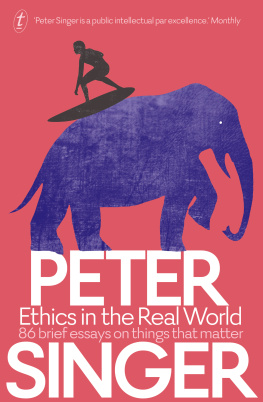Cover

| title | : | Refuting Peter Singer's Ethical Theory : The Importance of Human Dignity |
| author | : | Krantz, Susan F. |
| publisher | : | Greenwood Publishing Group |
| isbn10 | asin | : | 0275970833 |
| print isbn13 | : | 9780275970833 |
| ebook isbn13 | : | 9780313010668 |
| language | : | English |
| subject | Singer, Peter,--1946- |
| publication date | : | 2002 |
| lcc | : | B5704.S554K73 2002eb |
| ddc | : | 170/.92 |
| subject | : | Singer, Peter,--1946- |
Page i
Refuting Peter Singers Ethical Theory
Page ii
This page intentionally left blank.
Page iii

Refuting Peter Singers Ethical Theory
The Importance of Human Dignity

Susan Lufkin Krantz

Page iv
Library of Congress Cataloging-in-Publication Data
Krantz, Susan Lufkin.
Refuting Peter Singers ethical theory : the importance of human dignity /
Susan Lufkin Krantz.
p. cm.
Includes bibliographical references and index.
ISBN 0275970833 (alk. paper)
1. Singer, Peter, 1946 I. Title.
B5704.S554K73 2002
170.92dc21 2001036696
British Library Cataloguing in Publication Data is available.
Copyright 2002 by Susan Lufkin Krantz
All rights reserved. No portion of this book may be
reproduced, by any process or technique, without the
express written consent of the publisher.
Library of Congress Catalog Card Number: 2001036696
ISBN: 0-275-97083-3
First published in 2002
Praeger Publishers, 88 Post Road West, Westport, CT 06881
An imprint of Greenwood Publishing Group, Inc.
www.praeger.com
Printed in the United States of America

The paper used in this book complies with the
Permanent Paper Standard issued by the National
Information Standards Organization (Z39.481984).
10 9 8 7 6 5 4 3 2 1
Page v
This book is dedicated to
RICHARD A. GABRIEL
teacher, scholar, humanist, and dear friend
and to the memory of
RODERICK M. CHISHOLM
19161999
who taught us all that metaphysics still matters
Page vi
This page intentionally left blank.
Page vii
I abhorred the face of man. Oh, not abhorred! they were my brethren, my fellow beings, and I felt attracted even to the most repulsive of them, as to creatures of an angelic nature and celestial mechanism. But I felt I had no right to share their intercourse. I had unchained an enemy among them, whose joy it was to shed their blood and revel in their groans. Mary Shelley, Frankenstein |
They say that terror is a disease, and anyhow, I can witness that, for several years now, a restless fear has dwelt in my mind, such a restless fear as a half-tamed lion cub may feel. My trouble took the strangest form. I could not persuade myself that the men and women I met were not also another, still passably human, Beast People, animals half-wrought into the outward image of human souls, and that they would presently begin to revert, to show first this bestial mark and then that. But I have confided my case to a strangely able man, a man who had known Moreau, and seemed half to credit my story, a mental specialistand he has helped me mightily. H.G. Wells, The Island of Dr. Moreau |
We humanize each other by our willingness to include others within that basic fellowshipthe sick, the deformed, the retarded, the old. We have not become fully human unless we recognize their humanity. It is a mark of the humane to extend its own obligationseven to a kindness toward animals. Gary Wills, Under God: Religion in American Politics |
Page viii
This page intentionally left blank.
Page ix
Contents
Acknowledgments | xi |
Introduction | xiii |
Chapter One | The Goal of Ethics | |
Chapter Two | The Source of Moral Value | |
Chapter Three | The Role of Reason in Ethics | |
Chapter Four | The Principle of Equal Consideration of Interests | |
Page x
Chapter Five | Why Singers Principle of Equal Consideration Is a Threat to Morality and to Human Values | |
Chapter Six | On Human Dignity | |
Select Bibliography | |
Index | |
Page xi
Acknowledgments
This book could not have been written without a lot of help from my friends. Prof. Joseph Spoerl first inspired me to begin thinking about the work of Peter Singer when I foolishly mentioned that I couldnt understand why he was spending a sabbatical on that topic. The more I read, though, the more I saw the importance of it. Prof. Richard Gabriel encouraged me to turn my thoughts about Singers ethics into a book, pointing out that the time is ripe for it. Dr. Paul Gagliardi and Alison Felder Gagliardi, RN, kindly agreed to read the manuscript with a view to spotting errors in medical terminology. Professors Richard Gabriel, Benedict Guevin, Joseph Spoerl, John van Ingen, and Joseph Uemura all gave generously of their time to read earlier versions of the book, and offered many suggestions for improvement. Prof. Barbara Stahl helped me to understand better the biological issues involved. Able assistance by Lucille Murrell and Paul Taglini of the Department of Information Technology at St. Anselm College also has been much appreciated.Intheend,whileItakefullresponsibilityfortheerrorsand gaps that remain, I am hopeful that those who read the book will be prompted to think about the ethical issues of our day in light of genu
Page xii
inely human values, and to apply their intelligence in the very necessary project of developing a healthy moral image for the future.
Page xiii
Introduction
During the early centuries of the first millennium A.D., in a period now known as Late Antiquity, pagan philosophers were held in high esteem as one variety of holy men, uniquely in touch with the gods and able to mediate divine wisdom to the common people. The ideas those philosophers propounded were often far removed from the daily realities that most people faced, yet they carried weight culturally because the philosophers themselves were so respected. Ordinary people did not consider themselves qualified to criticize the philosophers ideas thanks to the general otherworldly aura surrounding philosophy.
Next page











